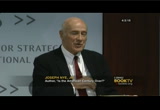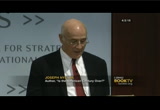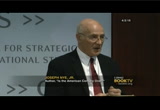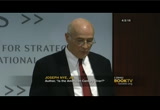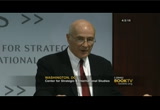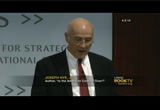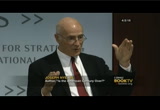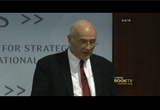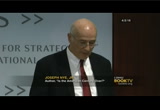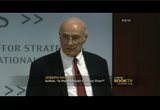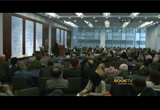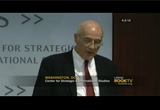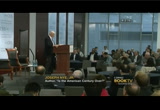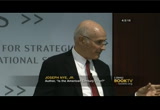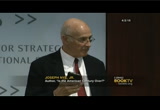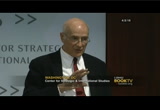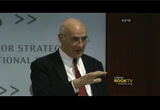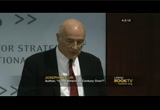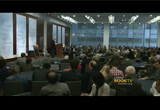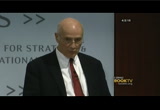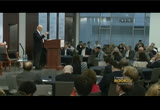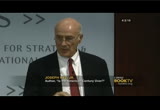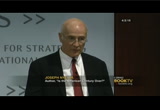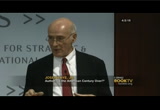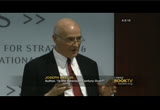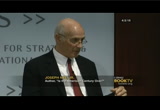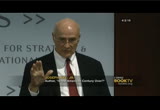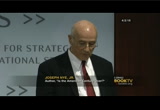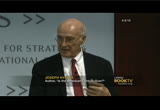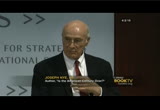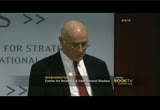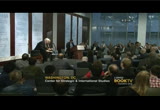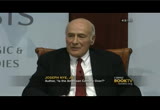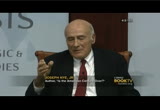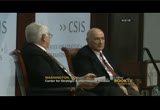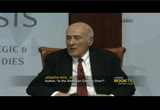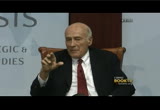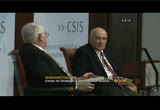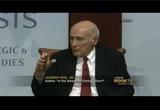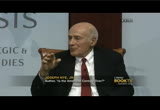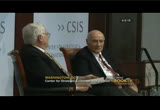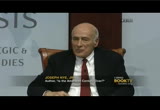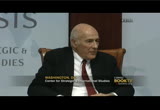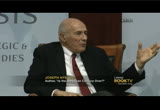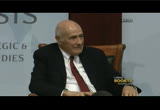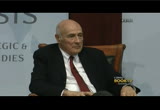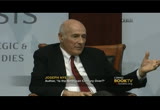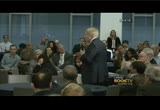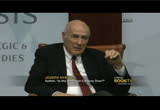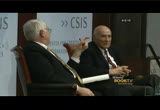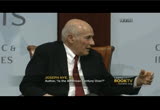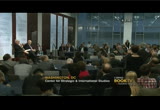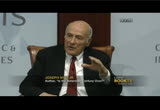tv Book Discussion on Is the American Century Over CSPAN April 12, 2015 8:45am-9:46am EDT
8:45 am
>> you are watching booktv. next, harvard university's joseph nye argues while there is a lot of talk about china replacing the united states as the supreme global power in the near future america's military economic and soft power spermaceti will continue for decades to come. >> thank you. well it's nice to be back at csis. it's an organization i deeply admire, only exceeded by but admiration for john hamre who i worked for as one of his trustees but also the policy board. i appreciate your being our host, john. let me say a few things about the argument of the book but i don't want to go on for too
8:46 am
long partly because professors talk to long anyway, but because the most fun of these events is to a degree of back and forth with questions and so forth. so if i'm too verbose, john stop it. i think the question of whether the american century is over is one that has intrigued a lot of people both here and in china. and it is a conventional wisdom that china is going to surpass the united states and the american century. in fact, if you look at the book by martin jock in british author, the title tells it all. it's when china ruled the world are my harvard colleague niall ferguson, the 21st century is the chinese century. and a little bit earlier this
8:47 am
year, it's about a year ago i should say the financial times had a headline which says that this was the year in which china had passed the united states. i thought these ideas were wrong, and part of that is what's in the book, to try to understand what the world will look like in 2041 which is 100 years after henry ruth made his famous proclamation of the american century. so if you look at this you can ask, well why bother? who cares who's number one? some people take this position. but the danger is if you don't understand power relations, if you make mistakes, you think you are stronger or weaker, you can get policy wrong. and there's a long tradition in
8:48 am
thinking about international relations that says that when a rising power creates fear in an established power that's the source of great conflict. this, of course, was the famous explanation for the peloponnesian war comedy event in which the ancient greek city state system toward self abort seems to be the center of the ancient world in the mediterranean. it was caused by the rise in the power of athens and the for the created in sparta. many people said last year as we were celebrating the 100th anniversary of world war i that world war i in which the european state system toward itself apart and ceased to be center of the global balance of power was caused by the rise of the power of germany and the
8:49 am
fear it created in britain. much too simple a view of the cause of world war i but it does indicate that when countries make mistakes about power relations or don't understand them it can have major consequences. and there is a view expressed by some which is a very distinguished political scientist at the university of chicago that says china cannot rise peacefully, that china and the united states are likely to have a conflict. if so, that's very bad news for our century. it would be extraordinarily disruptive and so the question of whether it's right that china is about to pass the united states and into the american century is more than more importance than just a matter of national pride. now, let me start by looking at
8:50 am
this question of whether the united states is in decline. one of the problems with the word decline is that we don't know what's the yardstick by which the measure. people talk about all the time, but if you look at a human organism, such as me i can assure you i'm in decline. we rarely last more than 100 years, but if you look at a social artifact, which is what a country is, we don't know what a lifecycle looks like. there was a famous british statesman of the 18th century horace, who, after britain lost, said whoa to us, we are now reduce to a manageable little island. he said this just on the eve of britain's second century which
8:51 am
is fueled by the industrial revolution. so when people say the united states, it's over and so forth how do you know? i mean what is the lifecycle of a country? and what would you know when you thought about decline? just to give you an example how even very impressive, poppe people can get it wrong henry kissinger and richard nixon often cited as the most thoughtful statesmen would have in terms of understanding the big picture 1968 70 or so, they thought the united states was in decline and that the world was becoming multipolar. they talked about multipolarity all the time. of course, by the end of the 20th century the world was unipolar, not multipolar. what happened? how did they get it wrong? well for one thing the united states began and ended the 20th century was about a quarter of the world's economy.
8:52 am
in between after world war ii we went up to nearly half the world's economy, because world war ii strengthened the united states and weakens everybody else. so from 1945-1970, indeed the u.s. share of world product went from nearly 50% back down to 25%, and so in that sense as kissinger and nixon looked at it was indeed a climate. however, the extra but that curve as though it was going to continue. in fact, it didn't. what it did is it flattened out and state that 25%. and in that sense their view that we were in decline didn't predict the way the sensuous going to into. so even very astute observers can make mistakes on this period which is a reminder that i too they be mistaken in what i'm saying but it helps to be self-aware as you make your
8:53 am
mistakes. so i'm just warning. the other problem with decline is that it's a confusing term in the sense that it can refer to absolute decline or relative decline to and they are not the same. for example, ancient rome was absolute decline. rome didn't succumb to the rise of another empire. it succumbed to hordes of barbarisms. the reason is because it had no productivity and its economy and because it had in the nascent warfare. they were killing each other for power. we may be gridlock for power but we don't kill each other unless you watch house of cards. in that sense the argument that people make that the united states is an absolute decline
8:54 am
has to be measured against the facts. and if you look at the facts demographically we are the one rich country which will hold its position as the third largest country by the middle of this century. all the others, europe, russia japan, so forth will be diminished in their demographic footprint. in energy, which everybody said a few years ago we were becoming hopelessly depended on important energy the energy association says north american navy having no reports in the '20s. if you look at research and development and new technologies, if you're going to look at the technologies that will be most important in this century, let's think of biotechnology, nanotechnology and information technology 3.0
8:55 am
the u.s. is general in the forefront on all of these. if you look at the universities that underlying technologies look at the rankings that are done i, let's say shanghai shenk university, just was not biased americans view of the top 20 universities in the world, 15 are un-american, none are chinese. and if you look at the nature of the goal to which this is embedded entrepreneurial culture with rich capital markets which can take it is and spread them into commercialization quickly, it's hard to beat the united states of this. so these comparisons of the united states with ancient rome as though we are in absolute decline, i don't think make any sense. what's a little more interesting is the idea of relative decline. and in that sense week ended the 20th century was about a quarter of the world economy
8:56 am
and the imf, the international auditors fund, now projects that the united states will probably be somewhere like 18% of the world economy by the 2020s. projections like this are somewhat inaccurate but if that's true it would indicate some degree of relative decline. you can also so refrain that by saying it's rise of the rest, the rise of china india, brazil, indonesia and so forth. and part of that has been an objective of american policy. so was its relative decline for the rise of arrests, is still going to leave the united states as the largest of the major actors. and if you think about the roles of the largest states in terms of leading in the production of public goods the united states will still be crucial for that.
8:57 am
so this is a prelude a clarification of what absolute relative decline means. it's a prelude to the question of will china pass the united states, and thereby end the american century. if you try to judge that it's worth noticing that very often when people make these projections, and make the projections based on just extrapolating the growth rates of gdp gross domestic product. and that's not a very good way to calculate it because it's not at all clear the chinese growth rate is going to stay that high. in fact, there are probably going to diminish. but the point is that even if you do take these projections you have to ask if you're talking about passing the united states in power commit to ask
8:58 am
about all three dimensions of power and power and falls of economic power and military power, which i would love together is hard power, and south park the ability to attract others and get what you want through attraction and persuasion. and let's look at each of those interned but let me spend most on economic power because that's the one that gets the attention of the headline writer such as the people who put this on the front page of the financial plans the year go. probably the financial times headline assistant something called purchasing power parity which is a good measure of welfare but not of power, you don't import oil or jet engines in purchasing power parity. yoube imported in exchange rates in dollars. and even so at some point if
8:59 am
china with 123 billion people growing at some rate above 7% or around 7% -- 1.3 billion -- doesn't stumble into the united states with 350 million people and going at about 2.5% doesn't stumble, you would expect the lines to cross probably in the '20s. china will have a larger overall economy in the u.s. measured by exchange rates. not everybody agrees with it. for example, charles wolf an economist at rand has recently come up with an essay in which he sees chinese growth rates as low, u.s. growth rates aside from he says china will not pass the united states into 2050. i don't know. these are disputable estimates you plug in your estimates about growth rates and you get the answer you want. but the point is that even if china has a larger economy than
9:00 am
the united states, let's in the mid '20s, in gross domestic product, size of the market is only one measure of power. it's an important measure. if i have a big market and i am trading with you and i deny you access to the market come as the chinese did to the norwegians over salmon, then obviously that's power. ..
9:01 am
instead, what do we pay for this? the cost is about $700 here and an iphone. and then you say where is it made? made in china. and you say all right, how much of the $750 does china get it? the components are from malaysia, taiwan and elsewhere. the royalties for design are american. marketing is american. it turns out china gets only a few%. so we imported product that trade statistics show that the $750 imports from china. in value added it is really mining chinese labor to put together components and design and ideas from elsewhere.
9:02 am
so it is not surprising that cheney sometimes complain that they are very good at producing jobs but not steve jobs. someday they will. they are working on it now. there's the brilliant chinese entrepreneurs. but as of yet, their economy is not as sophisticated as ours. another example of this to be money. people say look china has $4 trillion in reserves. this means china is going to dominate world currency markets. not if the money is not convertible and not if there are not deep rich capital markets and not if you have to worry about those markets. do you want to hold dollars china has been making a major push to clear more trade.
9:03 am
but it's only about 7% or 8% whereas the dollars over 80%. the difference is people feel that there is a sophisticated financial market behind any rule of law behind a dollar, which there is not yet defined. but the argument that this economy is equal to the other economy, if you don't think about sophistication in the economy, you are making a mistake. i could go on with that but i would simply note to take us back to an earlier point that this projection of china having a larger market than the u.s. by 2020 depends upon a high rate of chinese economic growth. and there is a questionnaire, which is if you say previous
9:04 am
countries have have high rates of economic growth japan had 10% economic growth at one point. if you take those countries overall and you ask how long does it take to return to modest rates of economic growth, larry summers and land project have done an estimate in which they look at the experience of other high-growth countries and their estimate does china would road about 3.9% just on the statistics, not any particular things about china in the next decade gave some people think that is too low. others think it is too high. what is interesting is the projections we have of the chinese issue they now say 7% is the new normal. i don't sell. i think the lower. in addition to that problem coming at the problem that china faces in terms of demography.
9:05 am
because of the one child policy, china workforce, labor force is peaking then you have more people in the next decade who will be either very old or very young and a number of workers to support them goes down. that leaves the chinese to say that they fear they may grow old before they grow rich. yet another problem they face if they need to change the growth model. the export led growth, which has been very successful so far has to be replaced by a more domestic consumption oriented growth. they have to get away from imitating technology whether stolen or purchased based on a long way to go.
9:06 am
and essentially they do very well up to a point. to get beyond that point they have to develop this indigenous capacity for innovation. shooting pain talks about this. he says we have to make sure we don't all into the middle income trap. easier to talk about that implement the policies to do something. finally, china has a problem as we make these projections of how it is going to handle the difficulties or issues related to political participation we know that when economies and societies reship her per capita income of around $10000 that they are increased demand for participation. if you or india you are poor be also inherited from the
9:07 am
british the constitution which gives you a design to solve the problem. china hasn't figured out how to solve this problem. i am sure they would like to have good answers, but they haven't. i don't think anybody knows the answer to this. as the project ahead, is not only statistical points i mentioned in the questions of how you evaluate, but also a lot of unknowns in the chinese economy. when people say china will pass in economic power and i say maybe there i doubt it here if you turn that the military power, there you find that the u.s. military expenditure is four times chinese military expenditure. if you take the cumulative capital goods, what we've purchased in the past, the ratio is more like 10 to one in the
9:08 am
american favor. china is investing -- decreasing its military budget in double digits for over a decade. this means that it is increasing its capability. they are probably going to show up primarily and regional capability rather than global capabilities. the job the u.s. navy has to protect allies and have a presence in the south china sea in the east china sea is becoming more difficult. not impossible, but more difficult as it grows. is china going to be a military power to rival the u.s. globally? not very likely. chen is going to be importing more oil from the middle east is the u.s. imports last. it is going to worry about sea lions and the increases in
9:09 am
military investment help with protect sea lanes through the streets of morocco. i doubt they will be relevant. i suspect i will still be a need for american decision. so military capacity will increase. it will give us more pressure but i don't think you will see a china which equals or rivals the u.s. has a military global power in the quarter century which is the time horizon than looking at. finally, let me turn to soft power, the ability to get what you want through attraction or persuasion rather than coercion or pain. china has been making efforts to increase soft power. in 2007, hu jintao told the 17th party congress of the chinese communist party that china needed to increase its soft power. if you step back and think about
9:10 am
that that is a very smart strategy. if you are a that is hard power military economic is going finally, the first thing that will happen is you'll scare your will scare your neighbors into coalitions to protect themselves against you. but if you combine the growth within increasing your soft power or check in the coming you are less likely to frighten people into coalitions are less likely to be at the fact it is the otherwise would be. so hu jintao's decision and she championed has led to billions of dollars to create things like confucius institutes or things like the chinese central television into an al jazeera global station in doing the same thing.
9:11 am
i think that is interesting. but the chinese are not getting that bit of a return on their investment. cheney's polls taken by the bbc for pew, reputable polling versus said the chinese soft power attractiveness goes up in africa somewhat latin america but not in asia and not in europe or north america. you say why is this? there are two reasons that determined not which china would have to overcome if he really wants to equal the united states of power. one is china has to unleash its civil society. a lot of americans off power or european soft power comes not from government broadcasting. it comes from essentially foundations, universities, hollywood cultural industries and so forth. china with communist party
9:12 am
control is very low freight into these aspects of civil society which unleashes their full creativity. the other problem china have is if you look at nationalism and disputes with neighbors china has particularly in the coastal areas, but also with india has disputes and because of rising nationalism in china, which is helping legitimize the communist party and may become more important as economic growth rates low. it is very hard to compromise. it is one thing to put up the confucius institute of vanilla to attract people to the true glories of traditional chinese culture. but it's hard for her philippine can immerse that this culture to feel warm towards china if china is chasing philippine shipping
9:13 am
outside of scarborough sure at the same time. we saw the same thing when the oil rig was within the area vietnam considers exclusive economic zone which led to anti-chinese riots. you say why doesn't china see this? why doesn't accommodate distances over. who is more nationalistic than him. if you become somebody who says let's do this peacefully, you will lose the bureaucratic competition at home. until china is able to unleash its civil society and find ways to manage these disputes without the nationalistic overlay now, then i think china is going to lag behind in soft power as
9:14 am
well. i was in all three dimensions of power, economic power as measured by sophistication as well as dies military power with their globally as well as regional and soft power considering both the civil society and territorial nationalism dispute. i don't think china is going to pass the united states and overall power. i once had a lunch a few years ago. he and i sat on a european company board at the same time and having lunch with him was one of the real treat of going to these board meetings. i asked him, what did he think was china going to pass the united states in this century or not? he said no. i think they will give you a real run for your money. they said i don't think they will pass you.
9:15 am
china can draw upon the talents of 1.3 billion people, but the u.s. can draw upon the talent is 7 billion people and what is more, it can reconvene them with a diversity which leads to much more creativity than you could ever get with ethnic nationalism. this of course i've ethnic on. i think there is something and not so long as united states keeps its openness and doesn't succumb to the fear or hubris. so to conclude this if i go back to this opening question to visit the chinese century, will attend the american century, is it going to produce a result like germany and britain did 100 years ago? no, i don't so. one thing worth noticing is germany had dirty past written
9:16 am
in an astra production by 1900. so germany was really on the heels of passing britain. the british bout that. if my analysis is correct china is not about to pass us. if that is correct, we have time to manage the relationship. so we don't have to succumb to ear and overreaction. my great worry when people talk about decline, talk about the century over, they generate fear and anxieties, which create the wrong types of policies. we can manage the problems of china and china creates a number of problems but it also creates opportunities and things we can benefit from working with china. international financial stability, and managing climate change the rise in control of
9:17 am
pandemics transnational terrorism. all of these areas where we in china can find common cause at the same time that we may be disputing territorial limits in the south china sea or the east china sea. so we are going to have to learn to have cooperation and competition with china at the same time. but we come to much to fear as we fear we are in decline. the chinese believe we could get policies that mess up what otherwise is a relation which can be managed. so that is part of what i was trying to get out by writing this book which summarizes some thinking i've been doing about america's role in the world for a much longer time than a mere 100 or 3040 pages in the book get the message about how we think of america's role in the world and how we relate to the country most likely to
9:18 am
challenge, it is a message policy makers need to take seriously. thank you for your attention. [applause] >> thank you area much. this is a splendid recounting of your book. i know there's many questions from the audience. i will just get you started if i may. let me just begin by asking a question. how much does our tortured domestic politics shape international perceptions of american power? >> it's a good question. i think too much is the short answer. we often damage ourselves by making us look weaker for dumber than we are.
9:19 am
if you take this asian international investment bank where we decided that people shouldn't join this chinese bank, they were a number of headlines in asia saying this is a sign of american decline. no it is -- but we should've said haslett go forward but make sure it is a transparent international institution. the british and german and others join it. touch more likelihood it will will be held through search accounting standards that there'll be less chinese corruption and the idea that we would spend political capital to stop it was. behind that was the fact when we agreed in 2010 to increase quotas for china and other
9:20 am
emerging markets in the imf the congress didn't pass it. for years we have been sitting on this, and it doesn't cost us much of anything. he becomes wrapped up with issues of sovereignty and control and so forth. or take the law of the sea treaty, which you can have as many chairmen of the joint chiefs of staff and former secretaries of state and defense come and testify this is in our interest and we go out in reaching east asia that china should obey the law as the treaty. have you ratify that? the majority of the american people don't want it? no. does the majority of the senate not wanted? no. a few senators decided it was our sovereignty. we did a lot of stuff for
9:21 am
things which does diminish our power below what it otherwise. the lack of games we do have a challenge when we have representative democracy it is hard to get a chance of national conviction and purpose that we don't have an enemy that seems to focus us. it is pretty pathetic to say we need enemies as a nation. >> i think that is right. i do worry we are going to create an enemy in china because we feel we need one. if my analysis is correct, we don't need a chinese enemy. chinese will cause us problems, but so do other countries. china is not like not the germany are not like stalin's russia. it is not an existential threat and it not about the path is. in that case we can be more relaxed and don't have to put them in the enemy's role.
9:22 am
if we don't have them, who is going to do it? >> those that manage democracy is more efficient than a popular democracy. how do you think this is going to play out? >> that is a great phrase for the chinese to use until you realize how the corruption as they are and if i'm correct that they are going to have a problem with managing this demand for participation as per capita income reaches $10000. i think that slogan is echoing the stone so good. for all of our problems united state still has capacity for change and even for the problems of gridlock when people say we are worse than ever not necessarily. thomas jefferson opposed george washington's treaty with england
9:23 am
worked to define it. so we've been doing this for a long time. more to the point, even if you say there is a trend -- a downward trend since the 1970s or 80s, it is worth remembering obama's first congress passed health care whether you like it or don't like it but they passed it and passed a stimulus bill and change the position of in the military. not a stagnant society in the meantime. health care costs have declined. unemployment is at 5.5%. a lot of the strength of the country is not just in washington. so if you ask me what i rather pay the political hand of washington for all its faults for the political end of beijing, i would much rather have washington.
9:24 am
>> we are coming up and sometime this spring or summer to find tpp, the transpacific partnership. big, big regional free-trade agreement with principles underlying it as the goal. but speediest in washington by the administration that this is about who sets the rules does china set the rules for trade or to reset the rules? that might be the way we should talk about it in the united states but that must sound pretty weird overseas. do you have a thought on this? >> the chinese often will bring not. they say is you're rebalancing towards asia containment? they say no. then why is tpp aimed against
9:25 am
us? the answer to that, the proper answer is we should be willing to have chinese participation. the administration has said that when china is able to those standards. if you think of it is open-ended trade agreements, open-ended in a sense they are not permanently excluding others, then it's more understandable. >> a misstep that one must question and i will turn to all of you. it's not from your book, but you're the kind of intellect to give us all perspective and insight on it. one of the great problems about being the world's only superpower and having to do with the regional superpowers is we have to integrate for five and six crises simultaneously, where is the regional competitors worry about one or two. do we have the attention span of the nation to be a global superpower? >> i think it's hard.
9:26 am
if you look at the bush administration friends of mine who were in the bush administration say that it wasn't made deliberate neglect of asia. it is just that every time you went to the situation room is something to do with afghanistan or iraq. you can increase the bureaucracy but a top of and decision-maker has only 24 hours in a day. when obama and his team came in talking about a rebalancing towards asia, which is a better word than pay the which is always not a very good word because it means turning away from other things, but if you looked at john kerry's address book -- not as address book, his travelogue, you wouldn't ask whether this is a rebalancing towards asia. he's obviously been absorbed by
9:27 am
the middle east. it may be the right decision, but if you ask can we do both at the same time, it is very hard at the top level decision-makers. >> forgive me. one last question. i know you had a chance to study this, but it looks like there was a surprisingly detailed agreement with iran. i think it is all too fresh for us to know what we think about it. do you have an initial impression? >> again, i would like to see what it meant. i just have whatever seat on my iphone this afternoon. if you see the major options were to try to reach an agreement which are cheaper on a year year away from nuclear
9:28 am
weapons with a detailed inspection regime and so forth versus just continuing the sanctions, but during the sanctions your radiance keep building centrifuges versus the bolton option of om or ran -- to bomber ran but then they go back and do the same thing again. if you look at those three abstract options, one is the best. but i do think before making a final decision i would like to see what they've decided on some of the details. >> thank you. let me open up the floor. let's just start with you in your kind of dusty pink sweater. the microphone is coming over to you. >> one question i have is in china there are hundreds of different languages and dialects where is in the united states, almost everybody speaks english. does not make any difference to
9:29 am
how well china can do in the future having so many different languages and dialects? >> well, dialects have been pretty able to overcome that. i don't think that is a major problem. more of a problem is how they deal with minorities which is more than a linguistic problem. it's how would they be integrated. island focuses much of the language part as the minority's part. [inaudible] >> i don't have that off the top of my head. >> why do we bring the microphone over. >> thank you very much. i would like to bring you back
9:30 am
to john henry's first question that the domestic potable situation. page 91 of the book, you talk about the fact that -- >> you've done your homework. >> you mentioned often partisan gridlock in washington is accompanied by innovation in the state. i wonder how you think about that now particularly as we look at the cultural wars that seem to be moving from washington to the states that seem to be as much gridlock or more. >> well, there are culture were problems and make you go across the state. louis brandeis just as brandeis said the states are the laboratories of this democracy that you can try things they are. so with the sick culture wars that spreads. it's like a fever or send them.
9:31 am
if you take a question like how you get more accurate or more representative congressional districts, which right now because of a terrible way in which we reapportion districts every 10 years you have so many safe seats that a republican has to make sure he has no competition to the right and a democratic has to make sure she has no competition to the left in the net effect is that the parties are further apart than the american public. the two states which are actually doing something about that. one is california with nonpartisan primaries. another is iowa with a truly independent redistricting commission. so that is an example of these laws in the states i think is less then the staffer to rethink
9:32 am
the way we elect our representatives. because that is what is creating some of the extreme partisanship. >> one follow up if i may. soft power. he did talk in 2004 at csis and presumably still great papers now and then. i wonder would you share your thought process in talking about how the obama administration has used tools of soft power in foreign policy? >> obama has tried and his work in some areas and not others. if you look at obama's speech in cairo of june 2009, that was a major effort to attract arab people by soft power. i don't think it has worked very
9:33 am
well because it turns out what you do is more important than what you say. do not send i give credit for trying in some areas that have done better than others. >> thank you. this month, it is 70 years since my father was freed. a year ago looking at the swimming pool instructions were a live, i saw 27 different types of instructions, which among others forced us to go out of the pool every half hour to do a chemical test on the quality of water. i told my wife, this is not the united states that would have freed my father.
9:34 am
there's been risk aversion that has been intrusive getting into the system more and more. do you have any comment on that? >> overregulation is a problem. there have been efforts if you look at the early days of the obama administration my colleague was given the specific job is going to regulations and seeing which ones you could get rid of. they did get rid of the number. we should be constantly thinking of ways in which you can reduce regulations which are not functional. doing a cost-benefit analysis to make sure you are throwing out the bathwater and not the baby is a hard challenge. >> jan little.
9:35 am
>> let me say to us question or comment if you move to virginia, we don't have the regulations out there. i would like to turn to the hardest of hard power, nuclear. what about the chinese and the americans and the russians? maybe it would've come out different. how does that play? does that ensure that we never have that kind of a war that would be the worst-case outcome for china or does it add a risk and their and of course russia and still maintain the biggest nuclear arsenals. that's another question in there. >> there still is nuclear risk and it takes constant attention as he spent much of your career doing. but there is also another effect which i once called the crystal ball effect, which is in 1914 if you've given bizarre the emperor crystal ball and fed here is a picture of 1918 and
9:36 am
look inside usc or empires dismembered. you will see tens of millions of people. you still want to go to war? nuclear weapons provide the crystal ball. that doesn't mean people can't drop the crystal ball and people can't miscalculate. the north koreans were looking. there is something that it makes people more prudent about war. doesn't mean it's impossible and that is why we have to be continually alert and aware. the nuclear factor is going to be with us for some time. >> joe, can i give you a very awkward question? >> i will tell you i admire him
9:37 am
if it makes sense, it is what i called aspirational rather than instrumental, a policy goal. in the near term of the kind of. i was talking about of a quarter-century adult pics though. >> in fairness, they outlined step-by-step. they did not embrace global zero. the gentleman over here in the yellow tie. first table. he's been very persistent. >> thanks so much. then from the national entre national intelligence council. i wondered if you could talk a little bit about global talent and how you see that affect in american power in the coming decades. often people point to the united states, canada a couple of other countries as being countries that do attract very
9:38 am
strong global talent not just because of our economic and educational strength but because there is a perception that we are welcoming cultures for the most part that immigrants can assimilate into another children will children will have good opportunities as well. other countries such as germany, many in europe are trying to do more to create that perception. first of all do you agree with that and secondly, do you think others are making up ground on the united states in terms of being that attractive power? thanks. >> appointed by quoting was that this is one of the great strengths of the united states that we can take talented people from all over the world. when we try to stop that we hurt ourselves. we are a nation of immigrants that franklin roosevelt once told the daughters of the american revolution to their
9:39 am
chagrin. the point is every generation complains about the next generation coming in. in the 19th century that the know nothing party which didn't want the irish catholics and within a century we had an irish catholic president. this capacity to assimilate and give people opportunities to use talent is one of our great strengths. australia does say canada does that and so forth but of the large developed countries in europe, russia and so forth they don't have that capacity. japan put the same problem. >> one last question right here. she got the microphone right behind you. >> , o'donnell i work in international affairs and now
9:40 am
i'm teaching in berlin. as you go through your analysis of china, very systematically the aspects to the aspects of attack him you could apply the issues to the united states. one of the elements people would've thought about this way. what struck me is could you talk briefly about applying the same categories and analysis to europe if anything there's a place place that had the industrial revolution and so forth, that is obviously lacking certain deaths in certain ways. could that be the rival to the united states in the future? >> in principle it could. the european economy when europe acts as an entity, which is sometimes is equal to the united states but the problem is that often has trouble acting as an entity on a lot of issues.
9:41 am
it also has severe demographic albums over the long term and it also has a severe energy problem in terms of how it manages the energy resources it has. and so all of those things i think would make me a break less likely if the global competitor. with that said no other part of the world with whom we share more values in europe. we should be rooting for europe to overcome this current period of doldrums because we need them as a partner. >> well, i've had the pleasure of knowing joe for 25 years. it's always been so refreshing to have a colleague who speaks in such calm and rational terms. they always convinces me i must say. i just wish our public debate at
9:42 am
9:45 am
549 Views
IN COLLECTIONS
CSPAN2 Television Archive
Television Archive  Television Archive News Search Service
Television Archive News Search Service 
Uploaded by TV Archive on

 Live Music Archive
Live Music Archive Librivox Free Audio
Librivox Free Audio Metropolitan Museum
Metropolitan Museum Cleveland Museum of Art
Cleveland Museum of Art Internet Arcade
Internet Arcade Console Living Room
Console Living Room Books to Borrow
Books to Borrow Open Library
Open Library TV News
TV News Understanding 9/11
Understanding 9/11
